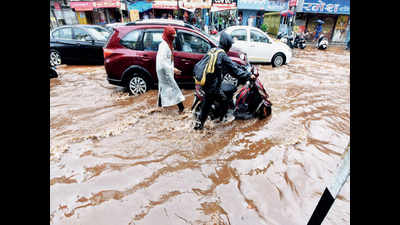Trending
This story is from August 20, 2019
Kondhwa resident tests positive for leptospirosis
A 23-year-old resident of Shivnerinagar in Kondhwa tested positive for leptospirosis on August 14.With this, the number of cases of the dreaded bacterial infection in the past two months in the city has risen to 11.

Floods facilitate the spread of leptospirosis
PUNE: A 23-year-old resident of Shivnerinagar in Kondhwa tested positive for leptospirosis on August 14.
With this, the number of cases of the dreaded bacterial infection in the past two months in the city has risen to 11.

The man suffered from fever, bodyache and weakness from August 7. He consulted a neighbourhood doctor for treatment. However, he did not show any improvement.His condition later worsened: he developed breathlessness from August 13. He was admitted to KEM hospital in Rasta Peth the same day. He was shifted to Critical Healthcare hospital’s intensive care unit on August 14.
Experts underscored the importance providing preventive doses of the antibiotic, Doxycycline, to help bring down the number of leptospirosis cases in flood-affected areas, which are particularly vulnerable to the disease.
“Floods facilitate the spread of leptospirosis, as the chances of contamination of floodwaters with rodent excreta are high,” Mangesh Tiwaskar, general secretary of Association of Physicians of India, said.
“Leptospira are corkscrew-like bugs which can enter the human body even through intact skin. People in flood-affected areas can contract this disease if their skin or mucous membranes, such as eyes and nose, comes in contact with floodwaters or damp soil contaminated with rodent urine,” he elaborated.
“We have already started administering the prophylactic antibiotic free of cost to those who walked through the floodwaters, irrespective of any wounds on the body,” Sanjeev Wavare, assistant medical officer of health, PMC, said.
With this, the number of cases of the dreaded bacterial infection in the past two months in the city has risen to 11.

The man suffered from fever, bodyache and weakness from August 7. He consulted a neighbourhood doctor for treatment. However, he did not show any improvement.His condition later worsened: he developed breathlessness from August 13. He was admitted to KEM hospital in Rasta Peth the same day. He was shifted to Critical Healthcare hospital’s intensive care unit on August 14.
“The man tested positive for leptospirosis antibodies (IgM) on August 14,” a doctor from Critical Healthcare hospital in Rasta Peth said.
Experts underscored the importance providing preventive doses of the antibiotic, Doxycycline, to help bring down the number of leptospirosis cases in flood-affected areas, which are particularly vulnerable to the disease.
“Floods facilitate the spread of leptospirosis, as the chances of contamination of floodwaters with rodent excreta are high,” Mangesh Tiwaskar, general secretary of Association of Physicians of India, said.
“Leptospira are corkscrew-like bugs which can enter the human body even through intact skin. People in flood-affected areas can contract this disease if their skin or mucous membranes, such as eyes and nose, comes in contact with floodwaters or damp soil contaminated with rodent urine,” he elaborated.
“We have already started administering the prophylactic antibiotic free of cost to those who walked through the floodwaters, irrespective of any wounds on the body,” Sanjeev Wavare, assistant medical officer of health, PMC, said.
End of Article
FOLLOW US ON SOCIAL MEDIA










